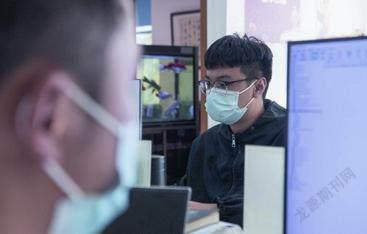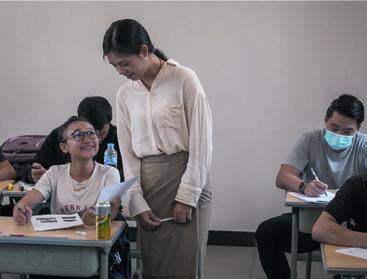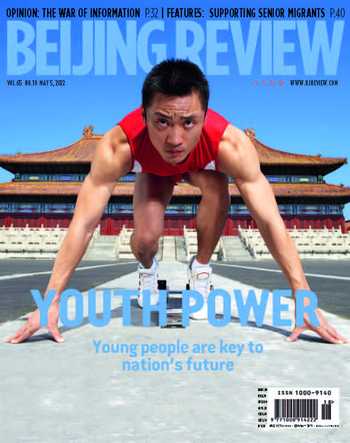NEW YOUTH LEADERSHIP
By Lu Yan


In April, a vlog created by user Lahongsang went viral on Bilibili, one of Chinas most popular video-sharing platforms. In the video, Lahongsang, a youth in Shanghai, documented her average day as a residential building leader in a locked-down community in the metropolis.
Many of the tasks she undertakes as a leader of a building with 170 residents seem trivial but are in fact crucial: notifying residents of the need to take nucleic acid tests, distributing groceries and daily necessaries from the government, dealing with all kinds of emergencies, and looking after the elderly and other vulnerable groups in the building.
She joked that the biggest role she had ever taken on prior to her current appointment had been as the class monitor in high school. Since taking on the role of building leader in late March, the college student sometimes came close to her breaking point under the pressure of her many responsibilities, including handling the constant flow of questions and requests from her fellow residents. However, she is adamant she will continue to do the job for as long as her neighbors need her.
“Although we cant fight the pandemic like medical workers on the frontline, I can still help everyone in my own way,” Lahongsang said in her video, adding that she is also deeply moved by all the heartwarming moments, for example, residents taking their surplus food outside and letting their neighbors who need it have it for free.
Lahongsangs videos have about 5 million views. Many viewers applauded her volunteer work as an example of the Chinese younger generations selflessness, optimism and love for all.
“Youth are the most active and vital force in society. The hopes and future of a nation lie in the hands of its young generation,”read a white paper titled Youth of China in the New Era, released by the State Council Information Office on April 21. The white paper also states that young people enjoy ample opportunities, shoulder heavy tasks and responsibilities in building the country, and cherish the global vision of a better future for all.
Being young
The white paper is the first to focus on Chinas youth. The document records achievements in the countrys youth development in the new era, and details what its youth are thinking and doing with clear examples.
The document was released ahead of Chinas Youth Day on May 4, which was established to commemorate the May Fourth Movement, a patriotic campaign that was initiated in universities in 1919 by young Chinese opposing the governments response to the Treaty of Versailles. The treaty treated China unfairly and undermined the countrys sovereignty in the aftermath of World War I. The movement triggered a national campaign to overthrow the old society and promote new ideas, including science and democracy. It gave birth to the May Fourth Spirit, referring to patriotism, progress, democracy and science, with patriotism at the core.288E1F88-8C13-417B-B59C-60454995F16A
“Compared with the older generation in their youth, were now benefiting from a bigger and more colorful world with numerous opportunities we can explore,” Liu Xiao, a university senior majoring in computer engineering in Beijing, told Beijing Review.
According to a survey, released in April and conducted by Fudan University in Shanghai and Bilibili,“hardworking” is still the main feature of todays Chinese younger generation, despite many describing themselves with self-deprecating humor as “lying down,” a term to describe those youngsters who have given up on ambition and do the bare minimum to get by.
According to the report, young netizens yearn for economic independence and look forward to improved social and economic equality. As many as 75 percent of those surveyed, born between 1990 and 2005, expressed aspirations for a better life, urging themselves to work hard and resist lying down. The majority of respondents believed that hard work is beneficial and relying on their own efforts can lead to a better life.
The survey also revealed that study, work, appearance and health are the four major sources of anxiety among young netizens. Young women, those who have studied overseas, people living in east China and highly educated youth are under more pressure than other surveyed groups.
In addition, the younger generation is showing growing confidence in their culture and their future, as well as a sense of national pride, Chen Lai, Dean of the Tsinghua Academy of Chinese Learning at Tsinghua University told Beijing Review.
In another report released in September last year by Dataway, a Chinese data analysis and service provider based in Beijing, over 97 percent of young people agree with Chinas social development path. Their confidence in the countrys global competitiveness was rated 9.1 out of 10, and those aged 15-25 had particularly high confidence, with a score of 9.2.
National pride is evident in the rising popularity of domestic brands among young consumers, many of whom are fans of products featuring traditional Chinese style and cultural elements, such as the crane and phoenix—legendary birds believed to be auspicious symbols—or similar embossed patterns on cosmetics packaging.
Young consumers, who grew up during the countrys economic takeoff, possess stronger confidence and a higher sense of national identity than those of other age groups, according to a report on people born in the 2000s, released by Chinese Internet giant Tencent in 2021.288E1F88-8C13-417B-B59C-60454995F16A
Dataways report also showed that Chinas policies for encouraging innovation and entrepreneurship have motivated young people to pursue flexible employment or start their own businesses. The white paper also mentioned that in creative industries such as IT services, culture, sports, entertainment and sci-tech, young people account for half or more of the workforce, and are at the helm of many unicorn and gazelle companies.
“Aligning individual inclination with national development, young people are putting their talents to use in innovation and starting businesses, and serving society in the process,” the paper said.
Making contributions
Liu, who, in addition to studying, is also currently an intern at ByteDance, a leading Chinese technology company, is looking forward to landing a job that can actually “make a difference,” in his words. “I would be honored to be hired by a company that not only leads the industry but more importantly shoulders social responsibilities and contributes to making the world a better place,”he said.

The aspiration of young people now is to “seek development and be responsible,” said Zheng Hua, Chief Talent Officer at Deloitte China, a financial consulting and advisory service provider. According to annual research conducted by Deloitte on both college graduates and its own employees, young people are now paying increasing attention not only to their own work, but also to their value to their organizations and society.“For instance, as soon as we release the list of charitable activities organized by our companys foundation, volunteer positions are snapped up in seconds, and more than 70 percent of the employees who participate in these charity activities are under the age of 30,” he said.
Zhengs view echoes the white paper. He says over the past 18 years, hundreds of thousands of college graduates and postgraduates have taken part in a program called “Go West,” working in counties in underdeveloped central and western regions to support development endeavors there through teaching and providing healthcare services.
Also, young people have always been the mainstay of volunteers providing services in large-scale events, such as the 2022 Beijing Olympic Winter Games, the 2008 Beijing Olympic Summer Games and the 2010 Shanghai World Expo.
They are also making global impact through exchanges. “As China opens its doors wider to the outside world, the countrys young people today are building a greater understanding of international exchanges and cooperation. They are embracing the world, pursuing broader and deeper integration with others… by studying, working, traveling, and participating in visiting programs abroad,” the document said.288E1F88-8C13-417B-B59C-60454995F16A
Through governmental and nongovernmental programs, Chinese youth are engaged in frequent international exchanges in fields including education, science, culture, arts, sports and the media under the cultural and people-to-people exchange mechanisms between China and other countries and regions.
Moreover, hundreds of young people from China work hard for the UN and other international organizations and contribute to world peace and development. Chinas young people are growing in confidence as they spread Chinas voice and express Chinas ideas at the UN Youth Forum, the UNESCO Youth Forum and other multilateral mechanisms and in international youth organizations such as the Asian Youth Council. This allows them to serve as young ambassadors of Sino-foreign friendship, the white paper says.
For example, at an online seminar on COVID-19 organized by the World Health Organization and other UN agencies in 2020, Wang Xiukun, a graduate student from Wuhan University in Wuhan, Hubei Province, shared her moving story of being a volunteer providing psychological and academic counseling to the children of frontline medical workers, and explained Chinas response to the pandemic.

Wang remembered that, after sharing her story, youth representatives from many countries told her that they were inspired and hoped to carry out similar services online to provide assistance to people in need in their countries.
“Hopefully I can help more people through my own experience, which has also inspired me to carry out more volunteer work in the future,” Wang said, adding that she particularly hopes that there will be more young people in the future to step onto the world stage, show the style of Chinese youth, and contribute to the building of a community with a shared future for humanity. BR288E1F88-8C13-417B-B59C-60454995F16A

